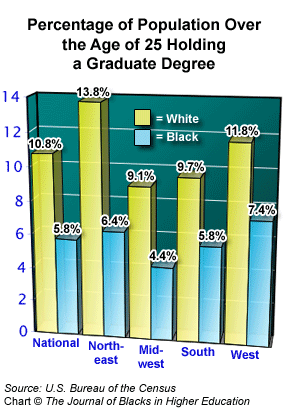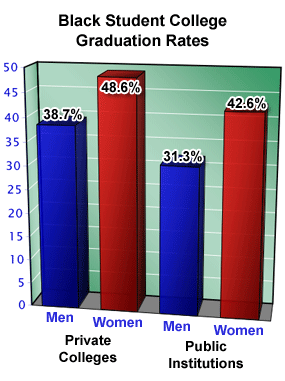Blacks Hold Their Own Under the New Race-Neutral Admissions System at the University of Michigan
 Last November voters in Michigan overwhelmingly supported a referendum called the Michigan Civil Rights Initiative which banned the use of race in admissions decisions at the University of Michigan and other state universities. Last November voters in Michigan overwhelmingly supported a referendum called the Michigan Civil Rights Initiative which banned the use of race in admissions decisions at the University of Michigan and other state universities.
It was feared that the race-neutral admissions policies of the university mandated by the new law would lead to a significant reduction in the number of black students at the University of Michigan. But the good news is that this is not the case.
This spring the number of applications from African Americans for admission to undergraduate programs at the University of Michigan was up 7 percent from a year ago. Preliminary data on this fall’s entering class shows that the number of black students who had mailed in an admissions deposit by May 20 was 2.3 percent higher than at the same point in 2006.
It must be noted that in 2006, when the public referendum on affirmative action admissions was a political hot potato, the number of black students who enrolled at the university dropped to 330 students compared to 443 the year before. Even though this year’s number appears not to have declined further, black first-year enrollments at the University of Michigan will still be well below their historical highs.
  |
“The money that African-American smokers spend on cigarettes in a single day could send more than 2,500 black students to college for an entire year.”
— Pathways to Freedom: Winning the Fight Against Tobacco (Centers for Disease Control and Prevention)
|
Regional Differences in Graduate Degree Attainment of Blacks and Whites
Last week JBHE reported the results of our analysis of regional differences in four-year college degree attainments between blacks and whites. Blacks in the western states are 34 percent more likely than African Americans generally to have a four-year college degree.
Now we turn to graduate degrees. Nationwide 10.8 percent of all whites over the age of 25 hold a graduate degree. This includes holders of master’s and professional degrees as well as doctorates. For blacks over the age of 25, 5.8 percent of all adults hold a graduate degree.
In graduate degree attainments blacks in the West are more highly educated than African Americans generally. Nearly 7.5 percent of all black adults in the West over the age of 25 have a graduate degree. Blacks in the Northeast also do better than the national average. In that region, 6.4 percent of all adult blacks have a graduate degree. In the Midwest, only 4.4 percent of all adult blacks have completed a graduate degree.
The racial gap in graduate degree attainment is largest in the Northeast. Some 13.8 percent of all white adults in the Northeast have a graduate degree. This is 7.4 percentage points higher than the rate for black adults. The racial gap is smallest in the South. There the percentage of white adults with a graduate degree stands at 9.6 percent. This is 3.8 percentage points higher than the rate for blacks over the age of 25 in the southern states.

Black Colleges Joining the Opposition to the U.S. News Ranking System
 Walter Kimbrough, president of Philander Smith College in Little Rock, Arkansas, is calling for all black colleges and universities to withhold ranking information from U.S. News & World Report. Kimbrough says that the rankings are inherently unfair to black colleges and universities. Walter Kimbrough, president of Philander Smith College in Little Rock, Arkansas, is calling for all black colleges and universities to withhold ranking information from U.S. News & World Report. Kimbrough says that the rankings are inherently unfair to black colleges and universities.
Dr. Kimbrough has sent a letter through the National Association for Equal Opportunity in Higher Education to all presidents of historically black educational institutions urging them to join the growing opposition to the U.S. News survey.
Kimbrough says that the U.S. News rankings favor colleges that reject most of their applicants and have large endowments to pay for the best facilities, faculties, and services. But the historic mission of the black colleges, according to Kimbrough, is to reach out to students who otherwise would not have access to higher education. Black colleges want to find ways to accept students, not reject the vast majority of applicants.
South Carolina Legislator Calling for an Investigation of the 1968 Orangeburg Massacre at the State’s Historically Black University
 Representative J. David Weeks of the South Carolina House of Representatives has introduced legislation calling for an official state investigation of the 1968 Orangeburg Massacre. In February 1968 students at historically black South Carolina State University mounted civil rights protests against a bowling alley that refused to admit blacks. State police were called in. Shots were fired and three black students were killed. Another 27 students were injured. Nine black police officers were charged in the incident but all were acquitted. Cleveland Sellers, then a senior at South Carolina State, was the only person convicted of a crime. He was sentenced to a year in prison for inciting a riot. Sellers, now a professor of history and director of the black studies program at the University of South Carolina, was pardoned in 1993. Representative J. David Weeks of the South Carolina House of Representatives has introduced legislation calling for an official state investigation of the 1968 Orangeburg Massacre. In February 1968 students at historically black South Carolina State University mounted civil rights protests against a bowling alley that refused to admit blacks. State police were called in. Shots were fired and three black students were killed. Another 27 students were injured. Nine black police officers were charged in the incident but all were acquitted. Cleveland Sellers, then a senior at South Carolina State, was the only person convicted of a crime. He was sentenced to a year in prison for inciting a riot. Sellers, now a professor of history and director of the black studies program at the University of South Carolina, was pardoned in 1993.
Weeks’ legislation calls for the establishment of a five-member commission with subpoena powers. The bill has 25 cosponsors in the South Carolina House, all but one of whom are black.
Three Finalists Are Revealed for Chancellor of North Carolina Central University
 This Friday Erskine Bowles, chair of the board of governors of the University of North Carolina system, is expected to appoint a new chancellor for historically black North Carolina Central University. The new chancellor will replace James Ammons, who left to take over the presidency of Florida A&M University. This Friday Erskine Bowles, chair of the board of governors of the University of North Carolina system, is expected to appoint a new chancellor for historically black North Carolina Central University. The new chancellor will replace James Ammons, who left to take over the presidency of Florida A&M University.
The three finalists for the position have been identified. They are:
• Reginald Avery, executive vice chancellor for academic affairs at the University of South Carolina Upstate in Spartanburg. He is a graduate of North Carolina A&T State University. He holds a master’s of social work degree from Aurora University and a Ph.D. from Brandeis University.
• Clarence Ambrister, senior vice president at Temple University in Philadelphia. A graduate of the University of Pennsylvania, he holds a law degree from the University of Michigan.
• Charlie Nelms, vice president at Indiana University. Nelms has previously served as president of the University of Michigan at Flint and the Indiana University campus at Richmond. A graduate of the University of Arkansas at Pine Bluff, he holds a master’s degree and an educational doctorate from Indiana University.
Five Black Students Win Jack Kent Cooke College Scholarships
 The Jack Kent Cooke Foundation awarded college scholarships to 46 low-income students who have gone through the foundation’s Young Scholars program. Students are selected in eighth grade and receive mentoring and funds to attend summer workshops. Students who have excelled in the Young Scholars program are eligible to apply for a college scholarship from the foundation. The Jack Kent Cooke Foundation awarded college scholarships to 46 low-income students who have gone through the foundation’s Young Scholars program. Students are selected in eighth grade and receive mentoring and funds to attend summer workshops. Students who have excelled in the Young Scholars program are eligible to apply for a college scholarship from the foundation.
Here are the five black students who will receive funds for college this year, their hometowns, and the college at which they will enroll:
• Ola Canty — Washington, D.C. (Harvard University)
• Rhiana Gunn-Wright — Chicago, IL (Yale University)
• Janiece Kelly — San Antonio, TX (Univ. of Pennsylvania)
• Emann Odufu — Newark, NJ (Sarah Lawrence College)
• Sade Scott — Chicago, IL (Hampton University)

UNIVERSITY OF CONNECTICUT

Office of National Scholarships Program Director/ UCP VIII
The Division of Enrichment Programs is seeking a director of the Office of National Scholarships, beginning July 6, 2007. The position is a ¾ time position with an end date of July 5, 2008.
The Office of National Scholarships (ONS) identifies, recruits, screens, and prepares exceptional undergraduate students to compete for prestigious national scholarships. The ONS raises the visibility of national scholarships such as the Rhodes, Marshall, Mitchell, Gates, Goldwater, and Truman among the university community. Its goal is to enable highly-qualified students from the University of Connecticut to become serious candidates for prestigious national and international scholarships.
Position Description: The Program Director of ONS is responsible for the day-to-day administration of the program and is expected to act independently within the goals and objectives of the program and the guidelines established. The ONS director will:
- Raise awareness among high-achieving students at the University of the availability of national scholarships.
- Develop programs to identify excellent candidates for such scholarships early in the students’ careers.
- Develop programs to assist interested students in preparing for national scholarship competition.
- Maintain an active and well-publicized schedule of workshops on specific scholarships, the scholarship process, and preparing effective applications.
- Recruit faculty members to work with individual students in their areas to obtain necessary experience and to prepare high quality applications.
- Assist candidates for scholarship competitions in identifying and funding enriching summer research, travel and service opportunities.
- Assist students in matching their backgrounds, skills and interests with the requirements of specific scholarship programs.
- Support student writing of personal statements and other application materials.
- Arrange application reviews for all applicants.
- Organize faculty teams to coach applicants in mock interview situations.
- Develop programs to celebrate students selected to apply for prestigious scholarships.
- Prepare, maintain, and update extensive website on national scholarships, advice for developing strong applications, and features on scholarship winners.
- Develop relationships with the official representatives of various national scholarship programs to ensure that UConn’s program reflects best national practices.
- Play an active role at the national level through participation in conferences, presenting papers, and networking with other national scholarship professionals.
Qualifications for the Position: Minimum qualifications include a bachelor’s degree in an academic discipline in the liberal arts and sciences and four to five years relevant experience; or masters degree and two to four years of relevant experience. A doctorate is preferred. The candidate should have knowledge of national scholarships and experience in working with high achieving students. The candidate would be expected to have excellent communication skills, the ability to identify and resolve problems, excellent organizational and administrative skills, the ability to plan and deliver workshops, course and curricula appropriate to the program, and the ability to work effectively with faculty, staff, students, administrators as well as external agencies/groups and the public.
Applications should be sent as email attachments in MSWORD format to honors@uconn.edu. Inquiries may be made to: Office of National Scholarships Director Search Committee, Honors Program, University of Connecticut, Unit 2147, Storrs, CT 06269. The closing date for all applications is June 15, 2007.
Application should consist of a letter of application, a current CV, and contact information for three professional references. The University of Connecticut is committed to diversity among its students, faculty and staff. Candidates from underrepresented groups are strongly encouraged to apply.

Appointments
 • Stephen F. Smith was elected a trustee of Dartmouth College. Smith, a 1988 graduate of Dartmouth, is John V. Ray Research Professor at the University of Virginia Law School. • Stephen F. Smith was elected a trustee of Dartmouth College. Smith, a 1988 graduate of Dartmouth, is John V. Ray Research Professor at the University of Virginia Law School.
 • J. Keith Motley was named chancellor of the University of Massachusetts at Boston. Motley has been serving as vice president for business, marketing, and public affairs for the University of Massachusetts system. Dr. Motley is a graduate of Northeastern University where he also earned a master’s degree. He holds a doctorate from Boston College. • J. Keith Motley was named chancellor of the University of Massachusetts at Boston. Motley has been serving as vice president for business, marketing, and public affairs for the University of Massachusetts system. Dr. Motley is a graduate of Northeastern University where he also earned a master’s degree. He holds a doctorate from Boston College.
 • William F. Tate, the Edward Mallinckrodt Distinguished University Professor in the Arts and Sciences at Washington University in St. Louis, has assumed the presidency of the American Educational Research Association. • William F. Tate, the Edward Mallinckrodt Distinguished University Professor in the Arts and Sciences at Washington University in St. Louis, has assumed the presidency of the American Educational Research Association.
Dr. Tate is a graduate of Northern Illinois University. He holds a master’s degree from the University of Texas at Dallas and a Ph.D. in mathematics education from the University of Maryland.
 • Jerlando F. L. Jackson was promoted to associate professor of higher and postsecondary education and granted tenure at the University of Wisconsin at Madison. • Jerlando F. L. Jackson was promoted to associate professor of higher and postsecondary education and granted tenure at the University of Wisconsin at Madison.
Dr. Jackson is a graduate of the University of Southern Mississippi. He earned a master’s degree in education at Auburn University and holds a doctorate from Iowa State University.
 • John H. Jackson was named president of the Schott Foundation for Public Education. He was the chief policy officer for the National Association for the Advancement of Colored People. • John H. Jackson was named president of the Schott Foundation for Public Education. He was the chief policy officer for the National Association for the Advancement of Colored People.
A graduate of Xavier University of Louisiana, Jackson holds a master’s degree from the University of Illinois College of Education and from the Harvard Graduate School of Education. He also earned an education doctorate from Harvard and a law degree from the University of Illinois.
|
The Gender Gap in Black Student College Graduation Rates
New data from the Department of Education shows a large gender gap in black student graduation rates. At private colleges and universities, black women have a graduation rate of 48.6 percent. For black men at private colleges and universities, the graduation rate was nearly 10 percentage points lower at 38.7 percent. At all public four-year institutions the gender gap was even greater among African Americans. Black women posted a graduation rate of 42.6 percent at state-operated institutions. For black men, the graduation rate was considerably lower at 31.3 percent.

Slight Decrease in Black Enrollments in Two-Year Community Colleges
For the year 2005, there were 878,834 blacks enrolled in two-year community colleges. Here there was actually a small drop in total black enrollments from 2004. In 2005 more than 47 percent of all black undergraduate students were enrolled in two-year programs. For whites, 41 percent of all undergraduates were enrolled at two-year community colleges.
A decade ago there were 621,000 African Americans enrolled in two-year community colleges. So over the past decade there has been an increase of 41.5 percent in black enrollments in two-year institutions.
Black First-Year Enrollments Are Down at Both Princeton and Harvard
 Two of the leading Ivy League colleges have announced preliminary data on black students for the Class of 2011 which will matriculate this fall. Two of the leading Ivy League colleges have announced preliminary data on black students for the Class of 2011 which will matriculate this fall.
Princeton University reports that 8 percent of its incoming class will be African American. This is down from a year ago when blacks were 9.1 percent of the incoming class.
At Harvard, black students are 8.7 percent of the incoming class. This is down from 9.3 percent last year.
Later on this year, JBHE will have information on whether this downward trend in black matriculations is occurring at other highly selective colleges and universities. The omens are not good.
Presidential Candidate John Edwards Has a Plan to Make College Affordable for All Qualified Students
 In 2006 John Edwards, the former U.S. senator from North Carolina who is now running for president of the United States, donated $300,000 to Greene Central High School in North Carolina. The high school serves a largely impoverished rural community where blacks and other minorities make up nearly two thirds of the students. Historically, only about 25 percent of the graduating seniors at the high school have gone on to college. In 2006 John Edwards, the former U.S. senator from North Carolina who is now running for president of the United States, donated $300,000 to Greene Central High School in North Carolina. The high school serves a largely impoverished rural community where blacks and other minorities make up nearly two thirds of the students. Historically, only about 25 percent of the graduating seniors at the high school have gone on to college.
The money donated by Edwards was used to pay for the first year of college for students of any race who took a college preparatory curriculum, refrained from drug and alcohol use, and did not have a criminal record. Under the program the number of students enrolling in college nearly doubled.
Now Edwards has made the College for Everyone program a key part of his presidential campaign. He proposes that the federal government guarantee college funds for students who adequately prepare for higher education in high school and have good disciplinary records. In return, the students would work about 10 hours a week while in college.
Edwards estimates that the program would cost taxpayers about $8 billion a year.

FLORIDA GULF COAST UNIVERSITY

Visiting Assistant Professor, Criminal Forensic Studies, Req # 0638
Required: Terminal degree or Ph.D. from a regionally accredited institution or equivalent accreditation in a discipline related to Criminal Forensics. Candidate shall have a minimum of five years experience in performance of actual Criminal Forensic Duties.
Preferred: Teach basic Criminal Forensic Courses (not specific to area of concentration). Candidates that have participated in major Forensic Recovery Operations or developmental research. Specialized Forensic skill set in areas other than Crime Scene Processing, Forensic Anthropology, or Forensic Behavioral Analysis.
Position Description: Teach courses as assigned in the Forensic Studies Degree Program using both distance education technology and traditional methods; preparing proposals for, directing and conducting applied research; and other duties as assigned to include serving on division, college, and university committees.
Knowledge, Skills & Abilities: Trained in the area of Forensic Science with appropriate certifications, etc. Also, the ability to disseminate pertinent information to a variety of audiences. Willingness to stay current in the Criminal Forensic field.
Experience or commitment to the use of technology including distance learning; university teaching; interest in collaborating both within and outside the University in the development and delivery of instruction resulting in improved student learning; and value continued scholarship and service to the school and university.
How to Apply: Visit http://jobs.fgcu.edu and apply to Req# 0638. Deadline Date: 6/18/07

Tuition Assistance Program for College Students in the District of Columbia Gets New Life
 In 1999 Congress passed legislation which permits students residing in the District of Columbia to attend state-operated universities anywhere in the nation and pay in-state tuition rates. Under the program, students attending private colleges or historically black colleges and universities can receive $2,500 in tuition assistance. Since 1999 the initiative has provided tuition assistance for more than 11,000 students. In 1999 Congress passed legislation which permits students residing in the District of Columbia to attend state-operated universities anywhere in the nation and pay in-state tuition rates. Under the program, students attending private colleges or historically black colleges and universities can receive $2,500 in tuition assistance. Since 1999 the initiative has provided tuition assistance for more than 11,000 students.
The program was set to expire on September 30 but it appears that a five-year extension of the program will be approved by Congress. And President Bush has indicated support for the measure. The tuition assistance plan costs taxpayers about $35 million annually.
  |
$14,119 Per-pupil expenditures in the 2004-05 academic year for K-12 students in New York State.
$6,575 Per-pupil expenditures in the 2004-05 academic year for K-12 students in Mississippi.
source: U.S. Census Bureau
|
No African-American Scholar Has Ever Been Granted Tenure at the University of Tampa
 By 1993 there were only two blacks on the 130-member faculty at the University of Tampa. Neither was tenured. In the late 1990s Arthur O. Hollist was awarded tenure as an associate professor of English. Professor Hollist is a native of Sierra Leone. By 1993 there were only two blacks on the 130-member faculty at the University of Tampa. Neither was tenured. In the late 1990s Arthur O. Hollist was awarded tenure as an associate professor of English. Professor Hollist is a native of Sierra Leone.
To this day, Hollist remains the only black scholar to hold tenure at the University of Tampa. Since Dr. Hollist is from Africa, no African American has ever been promoted to tenure at the University of Tampa. Today there are 80 academics who are in tenure-track positions but have not yet gone through the tenuring process. Not one of these 80 tenure-track scholars is black.
Blacks make up about 6 percent of the 4,100-member undergraduate student body at the University of Tampa.
A Reprieve for the 10 Percent Plan in Texas
 Two weeks ago JBHE reported that the state Senate in Texas passed a bill which would have permitted the University of Texas at Austin to limit the number of students admitted under the state’s so-called 10 percent plan. The program was established in 1996 after the U.S. Fifth Circuit Court of Appeals in the Hopwood case ruled that race-sensitive admissions were not permitted at state universities. That ruling was overturned by the 2003 Supreme Court decision in Grutter. Two weeks ago JBHE reported that the state Senate in Texas passed a bill which would have permitted the University of Texas at Austin to limit the number of students admitted under the state’s so-called 10 percent plan. The program was established in 1996 after the U.S. Fifth Circuit Court of Appeals in the Hopwood case ruled that race-sensitive admissions were not permitted at state universities. That ruling was overturned by the 2003 Supreme Court decision in Grutter.
Under this admissions procedure, the top 10 percent of each high school graduating class in Texas was guaranteed a spot in the first-year class at a state-operated university of their choice. The 10 percent rule obliges the University of Texas at Austin to admit students from often lower-quality (predominantly minority) high schools who have significantly lower grades and test scores. Critics of the 10 percent rule believe that the admissions program is lowering the overall academic quality of the students at the University of Texas.
The Senate bill would have permitted the University of Texas to cap the number of students who gained automatic admission under the 10 percent plan. The Texas House was expected to go along because it had passed similar legislation twice in the recent past. But in a surprise to many observers, the black and Hispanic members of the House put together a coalition to reject the bill altering the 10 percent plan.
Expanding Racial Gap for High School Seniors on History Portions of the National Assessment of Educational Progress
 Since 1994 black students at all grade levels have seen improvements in their scores on U.S. history tests used for the National Assessment of Educational Progress. But of particular concern is that between 2001 and 2006 the racial gap between black and white eighth- and twelfth-graders on the history test has expanded. For fourth-graders the gap between blacks and whites is larger than is the case for older students. But the racial gap for fourth-graders has remained the same since 2001. Since 1994 black students at all grade levels have seen improvements in their scores on U.S. history tests used for the National Assessment of Educational Progress. But of particular concern is that between 2001 and 2006 the racial gap between black and white eighth- and twelfth-graders on the history test has expanded. For fourth-graders the gap between blacks and whites is larger than is the case for older students. But the racial gap for fourth-graders has remained the same since 2001.
In Memoriam
Marilyn A. Campbell (1935-2007)
 Marilyn Campbell, a career educator, died late last month in Bloomfield, Connecticut. She was 71 years old. Marilyn Campbell, a career educator, died late last month in Bloomfield, Connecticut. She was 71 years old.
Campbell was a native of Montgomery, Alabama, and graduated with a degree in psychology from Talladega College. She went on to earn a master’s degree from Howard University and a Ph.D. from the State University of New York at Buffalo.
During a long career in the academic world, Dr. Campbell taught at Alabama State University, Florida A&M University, Peabody College, Meharry Medical College, and the medical school at the University of Connecticut. She was later an administrator for the Connecticut Department of Education.
Dr. Campbell appeared on the April 25, 1963 cover of Jet magazine under the headline, “Psychology Teacher Turns Model.”
Awards
 • James S. Jackson, professor of psychology and director of the Institute for Social Research at the University of Michigan, received the 2007 James McKeen Cattell Fellow Award from the Association of Psychological Science. The award is given to a scholar for lifetime achievement in applied psychological research. • James S. Jackson, professor of psychology and director of the Institute for Social Research at the University of Michigan, received the 2007 James McKeen Cattell Fellow Award from the Association of Psychological Science. The award is given to a scholar for lifetime achievement in applied psychological research.
 • Henry Louis Gates Jr., Fletcher University Professor and director of the W.E.B. Du Bois Center for African and African-American Research at Harvard University, will receive the inaugural Gordon Parks Foundation Award on June 18 in New York City. • Henry Louis Gates Jr., Fletcher University Professor and director of the W.E.B. Du Bois Center for African and African-American Research at Harvard University, will receive the inaugural Gordon Parks Foundation Award on June 18 in New York City.
 • Benjamin Carson, professor and director of pediatric neurosurgery at Johns Hopkins University, was named the Ford Freedom Award Scholar at the Charles H. Wright Museum of African-American History in Detroit. • Benjamin Carson, professor and director of pediatric neurosurgery at Johns Hopkins University, was named the Ford Freedom Award Scholar at the Charles H. Wright Museum of African-American History in Detroit.
 • K. Anthony Appiah, the Laurance S. Rockefeller University Professor of Philosophy, received the Arthur Ross Book Award from the Council on Foreign Relations for his 2006 book Cosmopolitanism: Ethics in a World of Strangers. The award comes with a $25,000 cash prize. • K. Anthony Appiah, the Laurance S. Rockefeller University Professor of Philosophy, received the Arthur Ross Book Award from the Council on Foreign Relations for his 2006 book Cosmopolitanism: Ethics in a World of Strangers. The award comes with a $25,000 cash prize.
Grants
 • Austin Peay State University in Clarksville, Tennessee, received a $20,000 grant from the state of Tennessee for the university’s Preparing Minorities to be Outstanding Responsible Educators program. The Project MORE program offers scholarships for six black students who want to become public school teachers. Nearly 30 percent of the students in public schools in communities surrounding the university are black. But only 7 percent of the teachers in these schools are African Americans. • Austin Peay State University in Clarksville, Tennessee, received a $20,000 grant from the state of Tennessee for the university’s Preparing Minorities to be Outstanding Responsible Educators program. The Project MORE program offers scholarships for six black students who want to become public school teachers. Nearly 30 percent of the students in public schools in communities surrounding the university are black. But only 7 percent of the teachers in these schools are African Americans.
 • North Carolina A&T State University, the historically black educational institution in Greensboro, received a $300,000 grant from Golden Leaf Inc. to establish the Advanced Composites Research and Training Center on campus. The center will retrain workers who have been laid off from jobs in the textile and furniture industries. • North Carolina A&T State University, the historically black educational institution in Greensboro, received a $300,000 grant from Golden Leaf Inc. to establish the Advanced Composites Research and Training Center on campus. The center will retrain workers who have been laid off from jobs in the textile and furniture industries.
|
 .
.